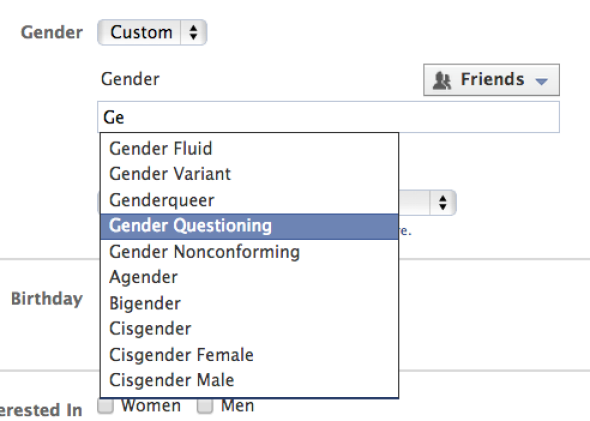Facebook has always come up with new ways to please its ever-growing member base. From fitting the lifestyles of those who wish to share minimal information to those who have a status update for every minute of the day, the infamous college start-up has evolved into becoming a “perfect fit” for everyone. Now, being no exception to Facebook’s growth, a new and long awaited feature has been added onto the “About Me” section of every user’s profile. For the first time since its official foundation in 2004, Facebook has officially added over 50 new options for those who identify with anything other than the female or male sex; and being, unbeknownst to many, that there are dozens of different genders identities that people choose to identify themselves with, Facebook agreed that it was about time to add the option.
The basic user profile now includes a drop-box customizable category that offers these 50+ gender identities. Everything from female and cis-male, to other or neither, the selections that are now offered are not only flexible to cater to individual preferences, but they are also as accurate and identifiable as possible. Facebook, in partnership with leading groups in gay and transgender rights, aimed for the terms to not only be there as a convenience for the millions of users previously denied the right to accurately represent themselves, but also as a way to further improve and expand on past efforts like that of Google+, who before this had offered the additional selection of “other” for its users.
Given the diverse way that people identify with their gender, it’s no surprise that Facebook decided to “get with it.” .Now, since many people still have yet to be properly educated about what it means to define someone’s sexually versus by their gender identity, awareness for this subject is on the rise. Besides considering people by their sex, gender identity refers to a person’s individual and specific preference as to what is to be identified as. As most would assume, this could go one of two ways; identifying with the gender that was given to you at birth, or identifying with the opposite gender that was given to you at birth. This assumption couldn’t be more wrong.
Not only are there dozens of ways to identify oneself according to gender, but there are also a variety of ways to coin one’s specific gender identification. For example, identifying yourself as the gender that correlates with your biological sex doesn’t just mean “female” or “male”. The terminology for this case extends to that of Cis Man, Cis Male, Cisgender, Cisgender Male, etc. Alternatively, if one does not identify with either gender, it could be a person identifying with Gender Nonconforming, which can be for identification or societal purposes, Gender Questioning, which can refer to one who may be questioning or considering their gender presentation or identification, or lastly Gender Variant, which refers to someone who varies between the two.
The ways to represent an individual’s preference for identifying themselves through gender are extensive, and by Facebook giving its users the opportunity to customize this feature of their profiles shows a necessary awareness and acknowledgement for the “final piece of the puzzle”. The feature will not only enhance the personal aspect of each person’s profile, whether or not they decide to display this or any information, but it will also help in lessening target advertising. One of the biggest outcomes of this addition, alongside the symbolic and proactive effects, will be the fact that choosing your gender identity or even changing your gender on your already existing profile, will not influence what ads you see all over your newsfeed. The change will not be listed under a “life event”, which means that companies can’t use it to their advantage, and ads remain based on your displayed interests and not what gender you ID yourself with. Being able to identify yourself by whatever term or label you want, or not, is fully your basic right, and Facebook even stated their crucial aim that, at the end of the day, they “…want you to feel comfortable being your true, authentic self”!







































































































